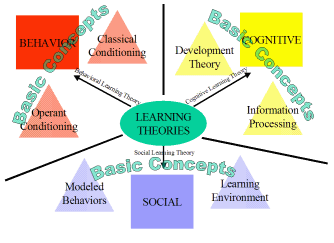
Behavioral Learning Theory - Web Quest

- Behavioral Theory
- Introduction
- Task
- Process
- Resources
- Evaluation
- Conclusion
- Cognitive Theory
- Social Learning Theory
Introduction
Definition of Behaviorism and how it applies to learning
Learning according to the behaviorist theory is an observable change in behavior.
General Assumptions of Behaviorist Theories
- Principles of learning apply equally to different behaviors and to different species of animals. (Equipotentiality)
- Learning processes can be studied most objectively when the focus of study is on stimuli and responses.
- Internal cognitive processes are largely excluded from scientific study.
- Learning involves a behavior change.
- Organisms are born as blank slates.
- Learning is largely the result of environmental events.
- The most useful theories tend to be parsimonious ones.
General Educational Implications of Behaviorism
Emphasis on behavior: students should be active respondents; people are most likely to learn when they actually have a chance to behave. Also, student learning must be evaluated; only measurable behavior changes can confirm that learning has taken place.
Drill and practice: repetition of stimulus-response habits strengthens those habits.
Breaking habits: one way to break a stimulus-response habit is to continue to present the stimulus until the individual is too tired to respond in the habitual way, or the exhaustion method. Also, the stimulus can be presented "faintly" so that the individual "learns" over time not to respond in the habitual manner, or the threshold method. Lastly, the incompatible stimulus method, would replace the habit with another habit, where eventually the individual adopts the "new" behavior in response to the stimulus.
Rewards: many theorists emphasize the importance of rewards or reinforcement for learning.
